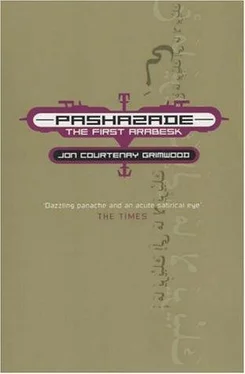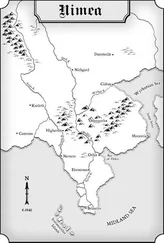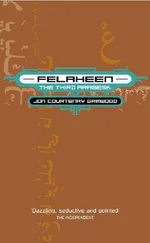'She said she was living on her savings,' Hani said, nodding at a seemingly endless list of red figures. 'She always did lie.'
Nothing in Nafisa's accounts made obvious sense, but Raf expected that. And he was beginning to see the pattern. His sense of self might be fucked, but he could knit connections from nothing and call it logic. Just as the madersa had rich public rooms and the private rooms had been bare even of furniture, so ran Nafìsa's accounts. Money had been spent lavishly on clothes but almost nothing on food. No payments at all for Khartoum or Donna. Very little on electricity, none on Hani's broadband connection, which meant it was either illegal or someone else was footing the bill.
So far, so predictable.
The surprise was in the brackets that ran like a sour river along the bottom line. Picking 1 January as a date and flicking back year on year showed that her account had been overdrawn for at least ten years, which was as far back as Raf bothered to check. Not huge amounts in someone like Hu San's terms, but getting larger and literally in the red. Until this April.
'Shit.' Raf was talking to himself but Hani squinted at the screen as he highlighted a figure. Hamzah had lied. She hadn't taken him for $2,500,000: her commission had been double that. $5,000,000 from Banque Leventine in Cyprus. Straight in and straight out again, almost immediately, only this time in two amounts. $4,500,000 to an account in El Iskandryia and $500,000 to Havana.
'Let me ...' Small fingers flicked over the keyboard, numbers resolving. The name that came up meant nothing to Raf.
Caja de Cuba.
'Want me to chase it?' Hani's voice was neutral.
'If you can.' Raf had no intention of asking when she'd learned to crack files — or how. He was far too worried she might stop.
'Okay.' And with that Hani squared up to the screen, smiled slightly and let her fingers loose, chasing one link after another, running searches and routines she seemed to pull out of the air. Beside her sat the rag dog, a mechanical whirr coming from its guts like a low growl.
'What..."
'Back up,' said Hani. 'The screen talks to him and Ali-Din remembers.' She sucked at her teeth to signal that Raf shouldn't ask any more questions and went back to work.
'Got it,' Hani said finally. 'Started here/ended Seattle. You want to know everywhere the $500,000 went in between?'
Raf didn't, so Hani cross-referenced the new account number to a customer bank database, which took almost no time at all because — unlike with Banque de Lesseps — the data at the Seattle end wasn't double-encrypted. This time the name meant something. Clem Burke, lately of Hunstville, registered as sole owner of Seattle's newest detective agency.
'Now the next one,' Raf told Hani. But she was already on it, leaning in close as if trying to crawl right inside the screen.
Raf was forgotten, he realized. The world outside did not exist. There was a hunger to the child's face, a intensity that reflected pure concentration. Her brows were knit, her lips clamped tight. This was the other thing in her life over which she'd had control. What she ate and what she did on screen were ring-fenced for her alone. A thin slice of a life that everybody else was parcelling up and deciding for her own good.
Ali-Din was a side issue.
'Got it,' said Hani. Numbers resolved as the screen on the VSV talked via uplink to a datacore at Banque de Lesseps and data fed back, anonymous and cold, nothing but presence and absence of electrical charge until on the other side of the screen to Hani an electron beam rastered down the glass and Hani swore.
H.E. Saeed Koenig Pasha. The General's own personal bank account. Shit indeed. Fear played inside Raf's head like a whistle off the walls of an empty courtyard, heard every day without really hearing, until one stumbled over oneself, sat cross-legged in the dust. Hani broke the connection without being asked.
Next they looked at payments that had come in. And the first and most obvious point was that until the $5,000,000 from Hamzah there had been nothing for at least nine months. Before that, going back five or six years, there had been regular payments, spaced maybe four or five months apart, starting big and getting less and less.
To Raf it looked like someone selling off the family silver and waking up one morning to find it was all gone. Maybe her outgoings would be more use.
'Try that,' he suggested, pointing to a small, fairly regular debit in Nafìsa's account. The last time it had been paid was the day he'd arrived in Iskandryia.
Hani went back to her screen.
Chapter Forty-two
1st August
'You must be Zara bint-Hamzah,' said the boy who opened the door to her. Before she could ask how he knew, the boy had stepped back and was ushering her through the front door of the General's palatial mansion on Rue Riyad Pasha.
He was about her age, maybe slightly younger, dressed in a simple shirt and tan chinos. A faint — a very faint — beard could just be discerned on his face.
'This is where I ask you if you have an appointment to see the General and you say no, but it's very important ...'
Zara nodded.
'A pity. You see, the General never receives anyone without an appointment. It's a matter of principle ...'
'I thought anyone could petition the General?' Zara said. She didn't mean to sound as upset by his news as she did.
'Of course,' said the boy with a smile. 'Anyone can. Just write a note and leave it. In five weeks' time, when the secretariat have worked their way down the pile, someone will read your note and, if necessary, bring it to his attention.'
'What counts as "necessary"?' Zara asked.
'A threat to his life. A threat to the life of the khedive. News of an uprising ... We get a lot of those.' He ushered her though another door into what looked like a dining room, then another, this time into a small study. On the wall was an oil painting of the old khedive and a smaller — if only slightly — portrait of the General wearing full uniform, with a curved sword hanging from his belt. The sword in question stood in the corner of the room, balanced upright like an old umbrella.
'Better not stay here too long,' said the boy. 'He doesn't really like people in his office.' From the top drawer of an ornate desk, he selected a key and used it to open French windows that led out to a garden.
'Come on,' he said, then paused. 'Have you been here before?'
Zara just looked at him until he shrugged.
'I'll take that as a No .'
Tall cedars rose from a lawn that was emerald green. The kind of lawn that old people talked about when they mentioned the mansions that used to line Mahmoudiya Canal, even though they'd never seen the lawns themselves and had only heard of them from their grandparents.
'Underground irrigation,' said the boy. Beds full of red and blue flowers that Zara had never seen before lined the path the boy chose. 'Come on,' he said, so Zara followed..Until he stopped at a metal bench set in the shade of a bush topiaried into the shape of a perfectly crenellated wall, and indicated that Zara should sit.
'No,' she shook her head. 'Not here.' A quick, almost embarrassed flick of one hand indicated him, then herself, the bench and its obvious seclusion. 'How can I?'
The boy looked surprised, but not irritated. 'We can walk,' he said simply and so they did: down another path until they reached a small lake with a fountain. Three stone women wearing very little stood, facing out, with their backs to each other. One of them held an apple and the other two, who were without the first's discreet stone drapery, used their hands to hide stone pudenda.
'Nakedness is not always a sin,' said the boy lightly. Then he smiled and shrugged, before adding, 'But, of course, that sentiment is probably heretical ...'
Читать дальше












